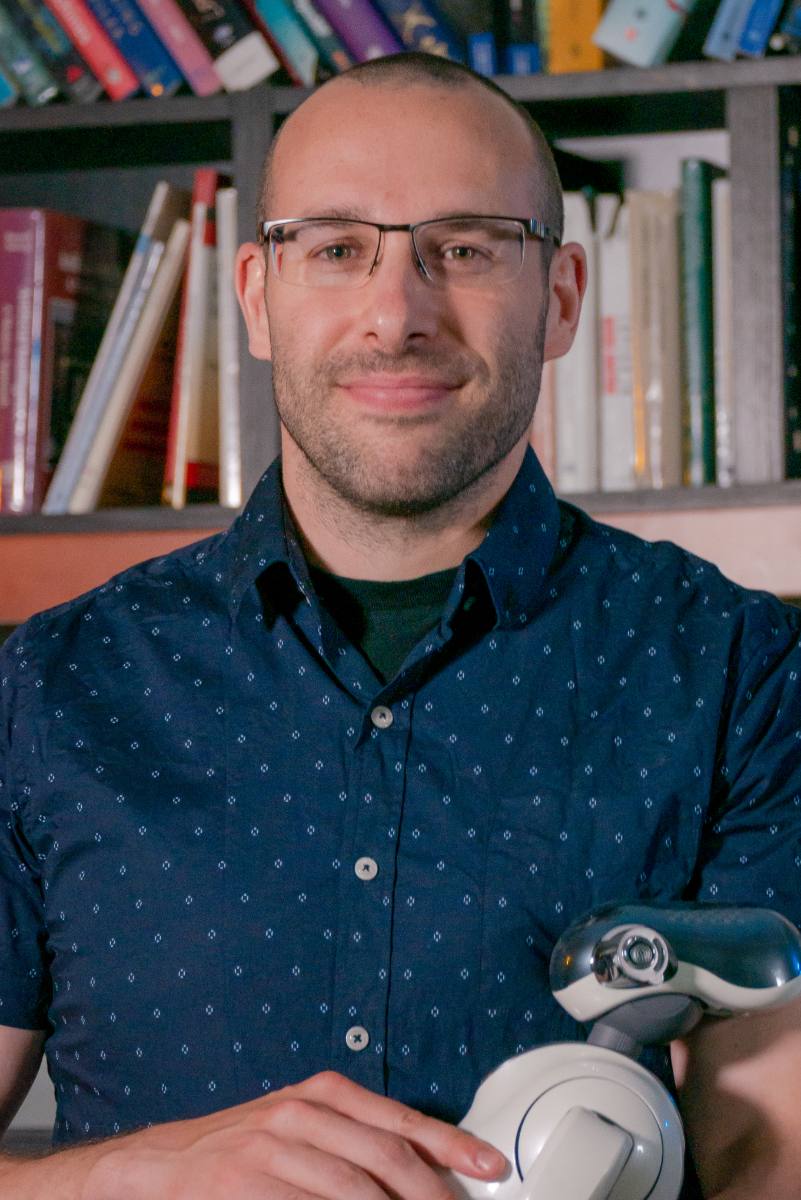
Adam White is a UAlberta alumnus and new assistant professor in the Department of Computing Science.
Can artificial intelligence (AI) have common sense? How would it develop, and what could it accomplish? It is questions like these that inspire Adam White, University of Alberta alumnus and new assistant professor in the Department of Computing Science.
Join us in welcoming Adam White.
Tell us about your research program.
I am generally interested in autonomous learning systems. In particular, I am fascinated by systems that can learn common-sense knowledge about how the world works through self-supervised, trial-and-error interaction. For example, children learn how their limbs work, how to manipulate objects, and all kinds of simple facts about the world by simply trying things and observing the outcomes. I want to understand the learning algorithms and internal representations that can be used in a computer program to allow this kind of learning to occur. I want to build simulated and robotic learning systems that learn for weeks and months-similar to human babies and animals-coming to understand the world and building on previous learning to understand more complex things and achieve goals.
We often call this the "life-long learning problem" in artificial intelligence. Although there has been significant progress on learning to classify images, understand text, and play video games, we generally don't have systems that can learn to do many different things. Our current learning systems require vast amounts of training data and are largely trained in computer simulations. To successfully build learning systems that can learn in the physical world with limited experience, we will need improvements in representation learning, exploration, and planning. My group is focusing on these three important and unsolved topics.
The potential impacts of progress in AI are really exciting to me. Improvements in autonomous learning systems can allow us to deploy robots in dangerous environments. Better algorithms can improve smart prosthetics, reducing suffering and improving quality of life. Perhaps closer to home, these technologies can help us be more efficient. Consider a robot vacuum cleaner. The best ones on the market build a map of your house and systematically cover the floor. This is based on decades-old algorithms that, in general, work pretty well. It's not too difficult for these robots to get stuck, and it makes sense: they have to be programmed to work well in a variety of homes. But imagine a world where these devices learn from their own experience and improve as they get more practice exploring the specifics of your home. Maybe your home has a wall of mirrors and the robot should learn to ignore its laser sensors in that area. Maybe you really want to spend extra time in the kitchen, but a quick rough job in the basement is good enough. Most practically, we want the robot to learn how to become unstuck, instead of awaiting your rescue. None of these capabilities are that far fetched, but they do require adaptive learning systems like the ones we are developing in my group.
What inspired you to enter this field?
I actually did my MSc and PhD here at the University of Alberta. Before coming here, I had never thought much about AI or even heard of the term machine learning. I signed up for Professor Rich Sutton's course on reinforcement learning, mostly because the picture on his website was warm and welcoming. I can remember the first AI I programmed in that course: it was a life-changing event. The agent simply learned to find its way to an unknown goal location on a small grid. I was stunned by how effective simple learning systems based on trial-and-error could be. After that, I was hooked and never looked back.
Tell us about your teaching.
I have taught reinforcement learning at the undergraduate and graduate level both here and at Indiana University. In the last year, I was the co-lead on UAlberta's new four course specialization on reinforcement learning with Coursera.
Whether it's teaching our students at UAlberta or the students around the world taking the course, my motivation is the same.
First, I am excited to be part of a student's first interactions with AI and machine learning. It's an exciting field, and students can create start-ups, come up with new and innovative applications, join the tech world, or go on and do research in AI. Second, I deeply enjoy helping students come to understand something new; seeing them light up when they get a new concept. I think it's very important to come to understand something in great detail, and that is something I try to get across in lectures on campus and in our videos online.
Interested in learning more about AI? Adam White teaches UAlberta's Reinforcement Learning Specialization online course, which explores the power of adaptive learning systems and artificial intelligence-a program open to both students and members of the public.